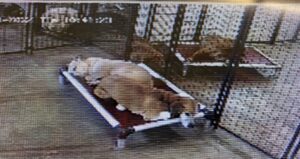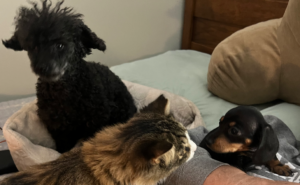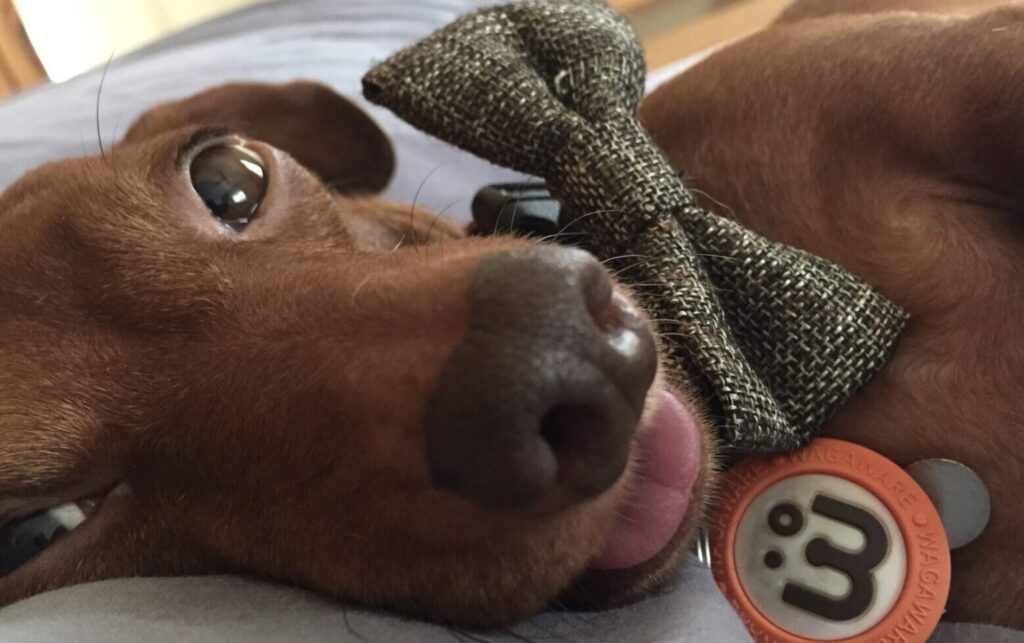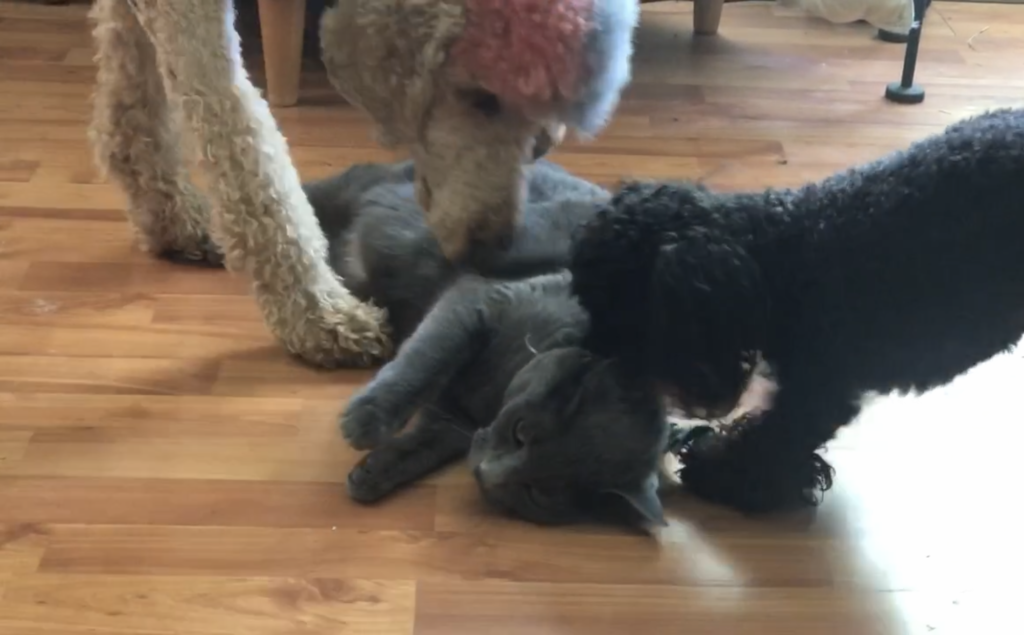
In my experience people wonder often about the need enroll their dogs in weekly socialization. Is it really necessary?
Puppies are most open to new experiences in the first few months of life.
Ideal socialization follows birth with up to 10 weeks living and learning with mom and littermates before adoption. Once your puppy is home, take them out and about right away.
Before allowing a puppy to walk around or play directly with dogs outside your family, it’s wise to complete early vaccines. Puppies will not be fully vaccinated before needing socialization. Your vet can help decide what’s most important.
Studies say some health risk is safer for our social dogs than a nervous or sheltered attitude from not being introduced to many new things in the first three months of life.
Ideally, dogs engage with other dogs throughout life but it isn’t critical once they become adults. Most dogs, giant breeds excepted, enter adulthood around eighteen months to two years of age.
Socializing as Adult Dogs
Do adult dogs really need to continue socializing with other dogs? In my experience they are less likely to seek interactions outside their family than most people are.
What if the adult dog you adopt wasn’t socialized properly as a puppy and is now very tense meeting other dogs? Their comfort and ability to trust you is most important. Forcing engagement with strangers may cause more harm than good!
Running daycare there were times I had to let people know their dog didn’t like it. Forcing the dog to attend was not ideal.
It is sad if media or friends make people with these dogs feel like failures. They were unneccesarily concerned their dog would be unhappy for the rest of their life.
If your dog doesn’t like daycare, it’s ok! As long as they can participate with you in activities outside the home without excess trauma, they’re probably living their best life. A few dogs don’t even need that!
In other words whether you hike, explore your neighborhood, go boating, or play games at home your dog is probably sticking close by you. Leashing dogs is the law in most areas of the USA anyway.
Adult dogs don’t really need to make contact with stranger dogs on a regular basis to be social.
In France during college I observed people with dogs on walks, shopping, and even at restaurants. Interactions between dogs out and about were uncommon and dogs mostly ignored each other.
How to socialize — for dogs
Does Daycare Work?
Daycare can work great for puppies if you don’t have another dog. Adult dogs don’t always appreciate it. It can be stressful to be around a bunch of strangers as an adult.
That said, some dogs do! Know your dog.
Well-run daycares work better than dog parks because these dogs make friends and are excited to see them again. If dog daycare is an option for your dog, try one day a week. Add or remove days depending on how your dog does at daycare and how they do when they come home.
Your dog’s desire to socialize will probably change during their lifetimes. Most often that means fewer days away as they age. Once home, your dog should be ready to rest with you and excited to return to play another day.
How do they act when you go back? Dogs should be happy to return once they get used to it.
Just like us each dog is different. A few are comfortable right away. Others may need several visits. Most dogs should attend weekly to be most comfortable and maintain friendships but again, all dogs are different.
Don’t keep pushing them if they don’t want to be there. Trust your dog.
Avoid obsessively watching cameras. Dogs rest a lot more than we do and you’ll probably feel your dog isn’t doing enough. Most dogs engage in minutes of play followed by much longer periods of rest.
Avoid care where dogs spend the whole day moving around. Once my staff told me of a place and showed me cameras. The dogs walked restlessly around a person standing in the center of the room. Nonstop. I had to terminate the feed. Poor pups!
In my care, we let the dogs set the pace and found that having a person in the group all of the time made it hard for them to take a break.

In a strange place without you, domestic dogs tend to compete for human attention. My goal for dog daycare was for them to have an opportunity to be with other dogs.
We created small groups of similar size and attitude during inside time. If a dog tried to stop others from playing inside, we moved the loafer to a quiet group. We watched cameras and listened for upset dogs instead of being visible in their space.
Larger groups of similar size went outside with 100% supervision for potty breaks and a big romp a few times each day. We observed which dogs wanted more interaction and other companions, adjusting inside groups as necessary.
My goal for playful groups was dogs resting around the edge and taking turns playing in the center. Calmer groups of dogs had dedicated beds and lots of quiet inside.
At times I distributed beds inside like cookies ready to bake, with space around each. Looking in a few minutes later I found all the beds rearranged by the dogs. They had dragged them into a corner of the room close together and settled in for a snooze. Success!
Are Dog Parks Better than Daycare?
Dog park visits may be useful if you stay on your toes. The following points are important for you and your dog to stay as safe as possible.
- Visit dog parks with caution and be ready to leave quickly.
- Leashes are not permitted. In the open space they can tangle. Being restrained may increase anxiety because dogs can’t escape interactions on their own.
- Your dog should be off leash trained and come when you call.
- Leave if people aren’t paying attention to their dogs.
- Leave if any dogs make you nervous because of how they act towards you or to your dog. Trust your gut.
- Check out different times and days. You might find a time when the park is less busy.
- Antisocial dogs should never enter a dog park. It’s not for them.
If daycare isn’t your dog’s thing, dog parks with strangers won’t be either.
If daycare and dog parks aren’t an option, try meetups with dog friends in your area, neighbor or family dogs your dog enjoys and are easy to visit weekly, or take your dog with you to dog-friendly places.
Ongoing classes that emphasize cooperation and avoid techniques your dog finds frightening or painful will help with boredom and should keep your bond tight.
Still think your dog needs something more?

Adding another dog or companion animal may be the best option for regular socialization. Many rescues foster to adopt so you can make sure your dog really likes the newcomer before making a commitment.
In my first home I had a privacy-fenced yard and a dog door. When I left for work, Willoughby and Ceili were rarely out of bed. If I came home for lunch they were often out exploring the yard together.
I raised both dogs from puppies and they were two of the most social dogs I have ever enjoyed as family members. Although they excelled out in public with me, they were content most days to be home alone together.
You are your dog’s family. Their favorite activity is probably spending time with you. For adult dogs that’s usually enough socialization.
Resources
There are many great books to help, a few mentioned below. I encourage purchasing or borrowing them. Our local and loyal customers may be able to check one out from WilloWisdoM. Amazon and DogWise.com are great resources for purchase. Hopefully you’ll find our podcast helpful as well as it grows!
Calming Signals: On Talking Terms With Dogs, by Turid Rugaas
It’s a quick read and very enlightening. It can help you learn what to watch for to stop trouble before it happens.
Dog Language – An Encyclopedia of Dog Language, by Roger Abrantes
A guide to canine body postures arranged from A to Z written by a scientist who specializes in animal behavior.
WilloWisdoM Podcast: about b2b-ca = brain to brain companion animals, aka telepathy




